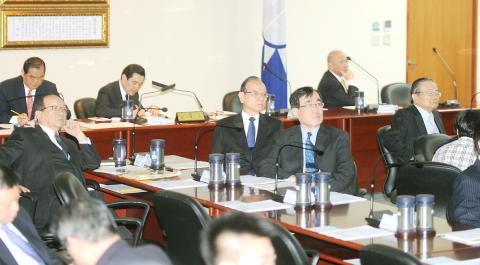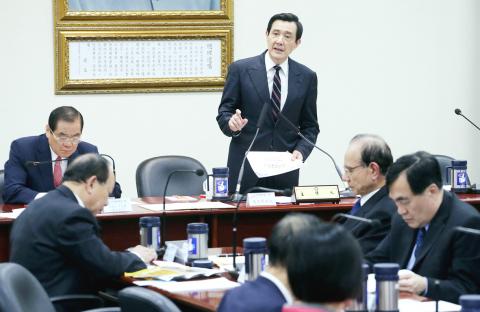President Ma Ying-jeou (馬英九), who also serves as Chinese Nationalist Party (KMT) chairman, yesterday nominated Taipei Mayor Hau Lung-bin (郝龍斌), New Taipei City Mayor Eric Chu (朱立倫) and Greater Taichung Mayor Jason Hu (胡志強) as the party’s vice chairmen.
The nominations were approved during a meeting of the KMT Central Standing Committee yesterday afternoon, after three of the six incumbent KMT vice chairmen — Lin Feng-cheng (林豐正), Chan Chun-po (詹春柏) and John Chiang (蔣孝嚴) — tendered their resignations recently.
The personnel reshuffle was touted as part of the KMT’s endeavor to reform the party following the conclusion of the 24-day student-led Sunflower movement, which occupied the legislature to protest against the KMT caucus and the Ma administration’s handling of the cross-strait service trade agreement last month.

Photo: Fang Pin-chao, Taipei Times
“The KMT and the nation are facing an enormous challenge right now. Since the heads of local governments have a better grasp of public opinion, [serving as KMT vice chairmen] will allow us to better express the opinions of the people to the higher echelons of the party and therefore help them formulate better policies,” Hau said on the sidelines of a press conference for sheltered workshops in Taipei yesterday.
“We should shoulder the responsibility together and do our utmost to assist the party,” Hau said.
When asked for comment, Chu said Ma informed him of the nominations on Tuesday night and the president expressed hope that the trio would serve as a bridge between the party and the people after they assume their roles.

Photo: CNA
However, Chu dismissed speculations linking the personnel change to the party’s strategic plans for the 2016 presidential election, saying: “It is only meant to facilitate better communication between local governments and the administrative and legislative branches of the government.”
Hu said that although he had previously said that he had no intention of taking over as KMT vice chairman, he accepted the nomination because “every KMT member is obliged to unite to save the party in a time of crisis.”
“I will do everything in my power to be a vice chairman who serves as the voice of the people and bring improvements to the party,” Hu said.
Most KMT members welcomed the decision.
KMT Legislator Lin Tsang-min (林滄敏) said the three incoming chairmen’s administrative experience was an asset to the KMT because it would help the party with its policymaking.
KMT Legislator Chi Kuo-tung (紀國棟) said that while Chan, Chiang and Lin Feng-cheng were highly respected in the KMT, it was better to have someone who could represent the party and carry out certain functions to serve as the party’s vice chairmen.
“The nominations should have been made long ago,” Chi said.
However, some Democratic Progressive Party (DPP) lawmakers disapproved of the nominations.
DPP Legislator Lee Chun-yi (李俊俋) was quoted by the Chinese-language Apple Daily as saying that Ma’s motive for designating the trio as party vice chairmen was to consolidate his power and to silence their criticism against the party and the government.
DPP Legislator Huang Wei-cher (黃偉哲) was quoted as saying that the nominations were a ploy by Ma to tame his enemies and that the trio might have only accepted the offer to avoid being alienated by the president.
“Ma previously offered the vice chairman position to Legislative Speaker Wang Jin-pyng (王金平). Wang declined, and Ma has treated him as a sworn enemy ever since,” Huang said.

The first global hotel Keys Selection by the Michelin Guide includes four hotels in Taiwan, Michelin announced yesterday. All four received the “Michelin One Key,” indicating guests are to experience a “very special stay” at any of the locations as the establishments are “a true gem with personality. Service always goes the extra mile, and the hotel provides much more than others in its price range.” Of the four hotels, three are located in Taipei and one in Taichung. In Taipei, the One Key accolades were awarded to the Capella Taipei, Kimpton Da An Taipei and Mandarin Oriental Taipei. Capella Taipei was described by

The Taichung District Court yesterday confirmed its final ruling that the marriage between teenage heir Lai (賴) and a man surnamed Hsia (夏) was legally invalid, preventing Hsia from inheriting Lai’s NT$500 million (US$16.37 million) estate. The court confirmed that Hsia chose not to appeal the civil judgement after the court handed down its ruling in June, making the decision final. In the June ruling, the court said that Lai, 18, and Hsia, 26, showed “no mutual admiration before the marriage” and that their interactions were “distant and unfamiliar.” The judge concluded that the couple lacked the “true intention of

EVA Airways today confirmed the death of a flight attendant on Saturday upon their return to Taiwan and said an internal investigation has been launched, as criticism mounted over a social media post accusing the airline of failing to offer sufficient employee protections. According to the post, the flight attendant complained of feeling sick on board a flight, but was unable to take sick leave or access medical care. The crew member allegedly did not receive assistance from the chief purser, who failed to heed their requests for medical attention or call an ambulance once the flight landed, the post said. As sick

INDUSTRY: Beijing’s latest export measures go beyond targeting the US and would likely affect any country that uses Chinese rare earths or related tech, an academic said Taiwanese industries could face significant disruption from China’s newly tightened export controls on rare earth elements, as much of Taiwan’s supply indirectly depends on Chinese materials processed in Japan, a local expert said yesterday. Kristy Hsu (徐遵慈), director of the Taiwan ASEAN Studies Center at the Chung-Hua Institution for Economic Research, said that China’s latest export measures go far beyond targeting the US and would likely affect any country that uses Chinese rare earths or related technologies. With Japan and Southeast Asian countries among those expected to be hit, Taiwan could feel the impact through its reliance on Japanese-made semi-finished products and